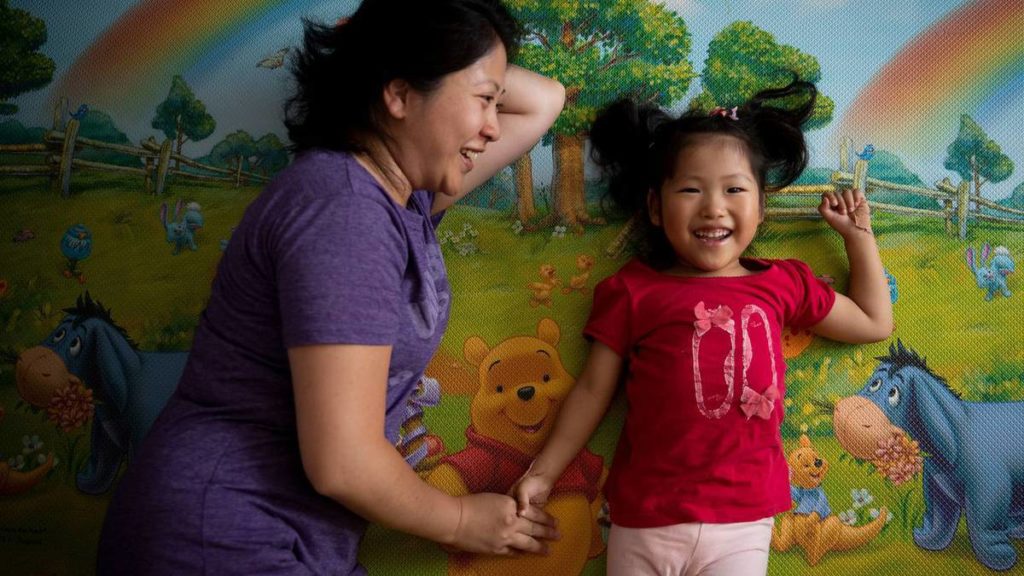Jessica Seo with her daughter 4-year-old Faith Seo who needs surgery to enable her to walk after she was born with Periventicular Leukomalacia which led to Cerebral Palsy. Video / Dean Purcell
A family heading to the US have put fears of catching Covid-19 aside to give their daughter the best chance of being pain-free and eventually able to walk.
Five-year-old Faith Seo, who has Spastic Quadriplegic Cerebral Palsy, was booked in last April for a surgery that isn’t performed in New Zealand, but it was postponed due to lockdowns both here and in St Louis.
Her parents rescheduled the surgery for this January – despite taking a risk that it could be less effective the older Faith got – but thinking at the time that a vaccine would be available and the risk of Covid-19 would have lessened.
During that time Faith’s muscles have progressively tightened, making it hard for her to put her legs in front of each other without crossing them over or to keep her hands by her side.
Fully aware the pandemic is only getting worse in the US, her parents thought long and hard about whether they should proceed with the trip but decided this was their best option to help their daughter – given the surgery is ideally carried out on children between the ages of 3 and 4.
“As her muscles get more tense it can make the surgery harder for her, she might have to have other surgeries … When they are younger their healing is much better and it will have a better result,” her mother Jessica Seo told the Herald.
But it means doing everything possible to eliminate the risk of the family getting Covid.
“It’s at a point that I need to think of every little detail to protect ourselves to take her there because I can’t predict the future and I can’t wait any longer [for her to have the surgery],” Jessica said.
“I just have to take her and I just have to have lots of courage … it’s very scary.”
The state of Missouri recorded 33 Covid-related deaths and 3276 new cases at the weekend. Across the US, the death toll has hit 374,000 while cases have topped 22.4 million.
Selective Dorsal Rhizotomy surgery, which is performed by renowned surgeon Dr Tae Sung Park, should ease the spasticity in Faith’s muscles and give her the best chance of being able to walk using a crutch or walker, and with less pain.
It has been a life changer for numerous other Kiwi children whose parents – like Faith’s – raised the money to have it performed overseas.
Their stories have given Seo hope that it could drastically improve her daughter’s quality of life too.
If successful Faith will finally be able have a full night’s sleep without waking up in pain.
Further down the track, she may even be able to play with friends without having to do it lying on the floor and speak in full sentences.
After 18 months of waiting for the surgery they will finally travel to Missouri next week.
She will spend a month there before returning home.
Herald readers dug deep last year and helped the family reach their ambitious target of raising the remaining $53,000 needed for the $150,000 surgery.
Seo was extremely grateful to the New Zealand public’s support – as well as help from friends and family overseas – because without the donations the trip would never have been possible.
Seo is taking every precaution she can to protect her family from getting Covid-19 and has brought protective gear including masks, shields, gloves and sanitiser. She is also planning for every eventuality should they have to stay in the US for longer than planned.
“We are just being very vigilant about looking after her. It is very important because if she does get Covid-19 her surgery will get delayed again so we are trying to be very very careful,” she said.
While Seo is firmly focused on getting Faith to the US for her surgery, she was under no illusion about the long road ahead of them and intensive rehabilitation that would be required in the next two years to enable her daughter to be able play with friends and walk independently.
Faith had been working hard with physiotherapists to improve her muscle strength and this along with other therapies would be very important when they returned home.
“We have a long hard road ahead of us.”
Dr Jennifer Summers, a senior researcher at Otago University’s department of public health in Wellington, said many studies had found SDR, which was a non-reversible surgery that required intensive physiotherapy for around two years post-surgery, improved gross motor function, quality of life and reduced pain.
“Given the strong clinical evidence for positive outcomes for many children following SDR, many NZ families make the decision to privately fund this surgery overseas treatment, along with the necessary follow-up physiotherapy.”
However, she said the surgery wasn’t suitable for every child with cerebral palsy, and there are studies which report adverse events.
“I hope that one day SDR would be funded in NZ: either for the surgery to be performed in NZ hospitals, or for the travel costs to be funded for Kiwi kids and their whanau as SDR is a life-changing procedure.”

